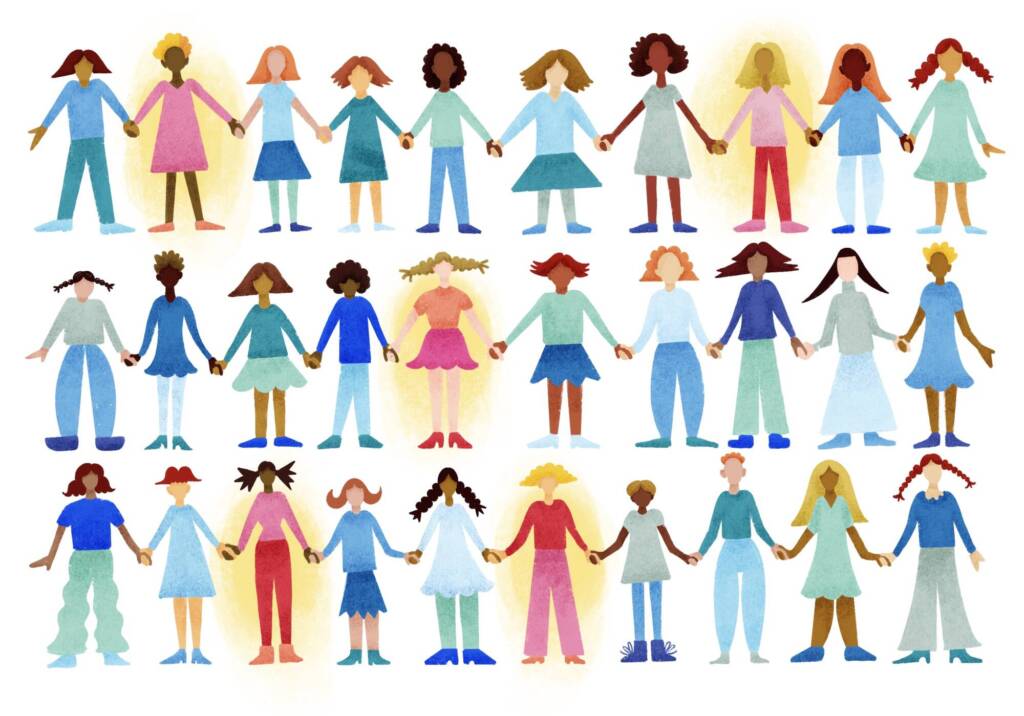Words by Mia Barnes // illustration by Hannah Moren
 Living with PCOS can feel frustrating at best and debilitating at worst. No matter how it affects you, you’re not alone — we’re part of a growing community of women (and gender diverse folks who have ovaries) battling this condition. Before I was diagnosed, I had no idea other women experienced these symptoms. From weight fluctuations, intense body hair growth and irregular periods. It was so easy to slip into a self-critical mindset, but no one deserves to live with negative self-talk while battling PCOS symptoms.
Living with PCOS can feel frustrating at best and debilitating at worst. No matter how it affects you, you’re not alone — we’re part of a growing community of women (and gender diverse folks who have ovaries) battling this condition. Before I was diagnosed, I had no idea other women experienced these symptoms. From weight fluctuations, intense body hair growth and irregular periods. It was so easy to slip into a self-critical mindset, but no one deserves to live with negative self-talk while battling PCOS symptoms.
Seeing more people openly discuss PCOS on social media sparked my curiosity about whether the condition is being diagnosed more frequently these days. I wanted to explore if this increase is real and what it might mean for those of us with ovaries. Discovering the rise in diagnoses and understanding how PCOS affects those who experience it has empowered me and motivated me to bring even more women into this important conversation.
What Is PCOS?
PCOS, or polycystic ovarian syndrome, is a condition that affects individuals born with ovaries. When a hormonal imbalance occurs, it can interfere with the development and release of eggs during the menstrual cycle. This imbalance may also lead to a range of symptoms commonly experienced by those with PCOS, such as:
- Irregular menstrual cycles
- Occasional to frequent ovarian cysts
- Excess facial or body hair
- Weight fluctuations
- Acne
While acne and irregular menstrual cycles can happen to any of us, people with PCOS experience these symptoms more intensely and unpredictably. My severe cramps and heavy bleeding made me cancel countless plans with friends who never seemed to struggle with the same symptoms.
When I tried to relate to my friends about constantly dealing with chin hairs, they couldn’t understand. I avoided consulting my gynecologist for years because I felt ashamed of not having more control over my body.
How to Get a PCOS Diagnosis
If you think you have PCOS, you need to see an endocrinologist. An endocrinologist is a medical expert who specialises in treating the organs that produce our hormones. You’ll need a referral from your primary care provider to see this specialist though, so your first port of call is your GP.
After your doctor sends their referral to a local endocrinologist and you get an appointment scheduled, you’ll need to prepare for a blood test. The endocrinologist will test your blood to measure your hormone production and insulin levels. You might also see your gynecologist for an ultrasound, which uses high-frequency sound waves to show if you have any previous or current ovarian cysts.
Doctors will look for two of the three Rotterdam criteria required to diagnose someone with PCOS, which include:
- Elevated testosterone or androgen levels
- Oligo-anovulation, which is a menstrual cycle lasting longer than 35 days more often than a standard 28-day cycle
- Polycystic ovarian morphology, such as cysts, numerous follicles or large ovaries
I used to think everyone with PCOS would have cysts, but that’s not entirely true. You may have a normal ultrasound but still have reproductive hormonal imbalances that cause your symptoms. Finding an expert who looks for all the Rotterdam criteria is crucial to get the most accurate diagnosis.
The Rotterdam criteria represent just one path to getting help for PCOS symptoms. It’s a form of Western medicine that focuses on hormone level readings to connect people with hormone treatments, but Eastern medicine has potential solutions, too. Traditional Chinese medicine utilises herbs and acupuncture to help resolve pain, regulate insulin levels and assist with fertility. Keep an open mind to different types of treatments so you can find what best supports your unique body.
Are More Women Being Diagnosed With PCOS?
So to get to my earlier questions, are more women being diagnosed with PCOS? A recent study found the rates of PCOS diagnosis rose 1.91% from 2007 to 2017, according to the latest research. If you’re like me, you might think that doesn’t sound like a significant statistic at first, however, we have to remember that number is from 194 sampled countries and the millions of people within them.
The study did not include PCOS diagnoses for trans and non-binary individuals, so the actual number may be significantly higher. Investigating non-binary and trans individuals who take testosterone could be crucial for understanding how testosterone impacts those with PCOS.
The encouraging news is the study’s finding means there are almost 22 people with PCOS in a crowd of 100,000 individuals. Imagine Melbourne Cricket Ground during the AFL Grand Final. The stadium can hold slightly more than 100,000 people. The study showed that if Melbourne Cricket Ground filled to capacity, 22 people in that crowd would have PCOS. It definitely helps me feel less alone.
Plus, other experts note 26% of Australian women report PCOS symptoms. It’s more common than most people realise, meaning more out there could find relief through a diagnosis.
Several factors may contribute to the rising diagnosis of PCOS. As more people openly discuss the condition, others might begin to recognise symptoms in their own health histories. Additionally, advancements in technology over the past decade, including improved blood testing and diagnostic imaging, have made it easier to trace symptom histories and identify previously undiagnosed cases of PCOS.
Medical experts are also using AI to read patients’ symptom histories and get diagnosis suggestions they might otherwise miss, like PCOS. Nanotechnology is even diagnosing PCOS from inside patients, which may become more commonplace with time.
We’re a Strong Community That Deserves Accurate Health Care
The increasing number of PCOS diagnoses brings a sense of hope, as it reminds us that we are not alone in our struggles. When I received my diagnosis, I felt isolated, as if I were the only person in the world dealing with this condition. Realizing that many others share the same symptoms has helped me embrace my body with less self-judgment. Moreover, a rise in diagnoses can lead to more research into effective treatments.
Technological advancements also play a crucial role in providing accurate medical support, particularly in the often-overlooked field of female reproductive health. I hope that continued progress will lead to improved healthcare, enabling those with PCOS to receive timely diagnoses and effective treatment options that enhance their quality of life each month.
If you experience symptoms of PCOS, I encourage you to reach out for help—knowing that you’re not alone and taking that step can truly make a difference in your journey.






